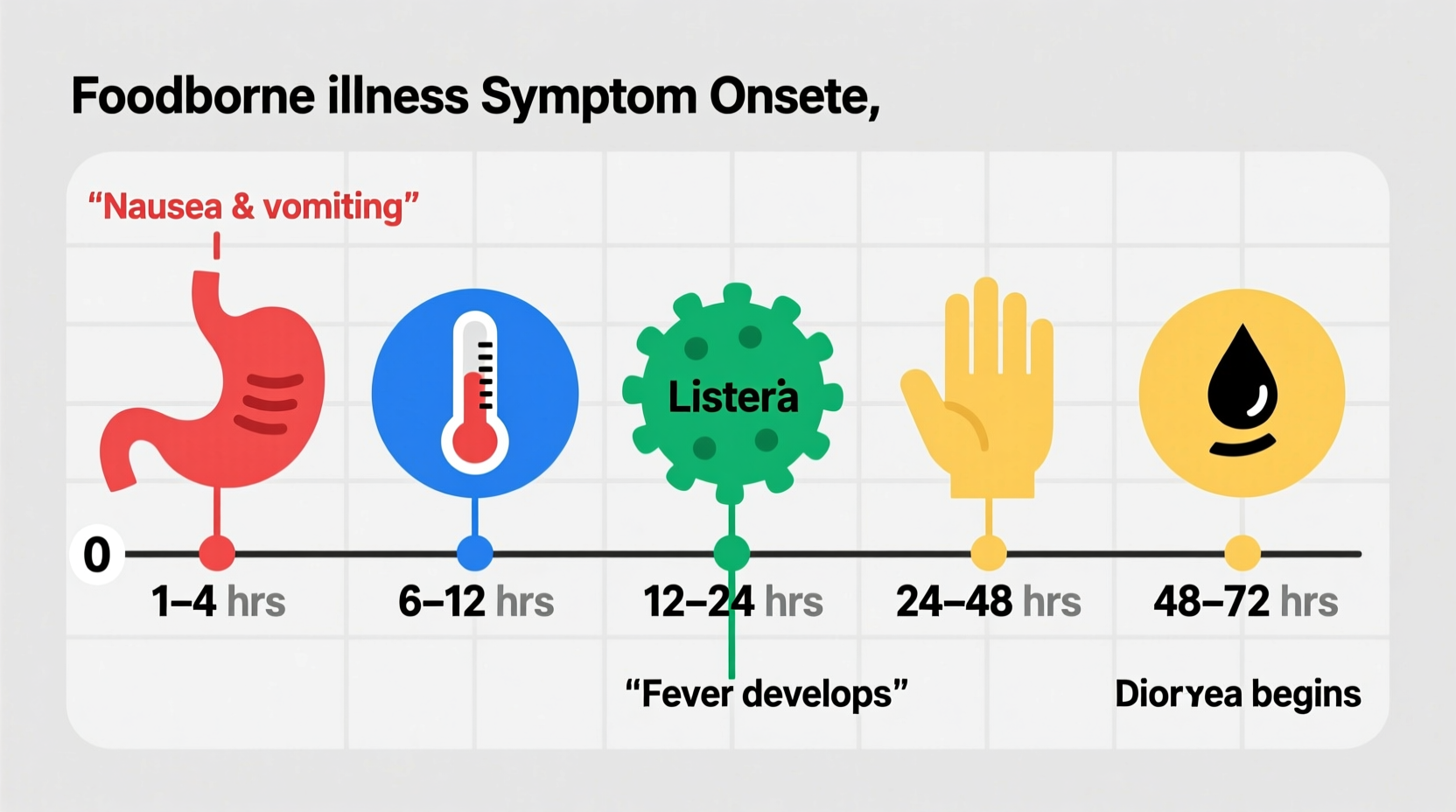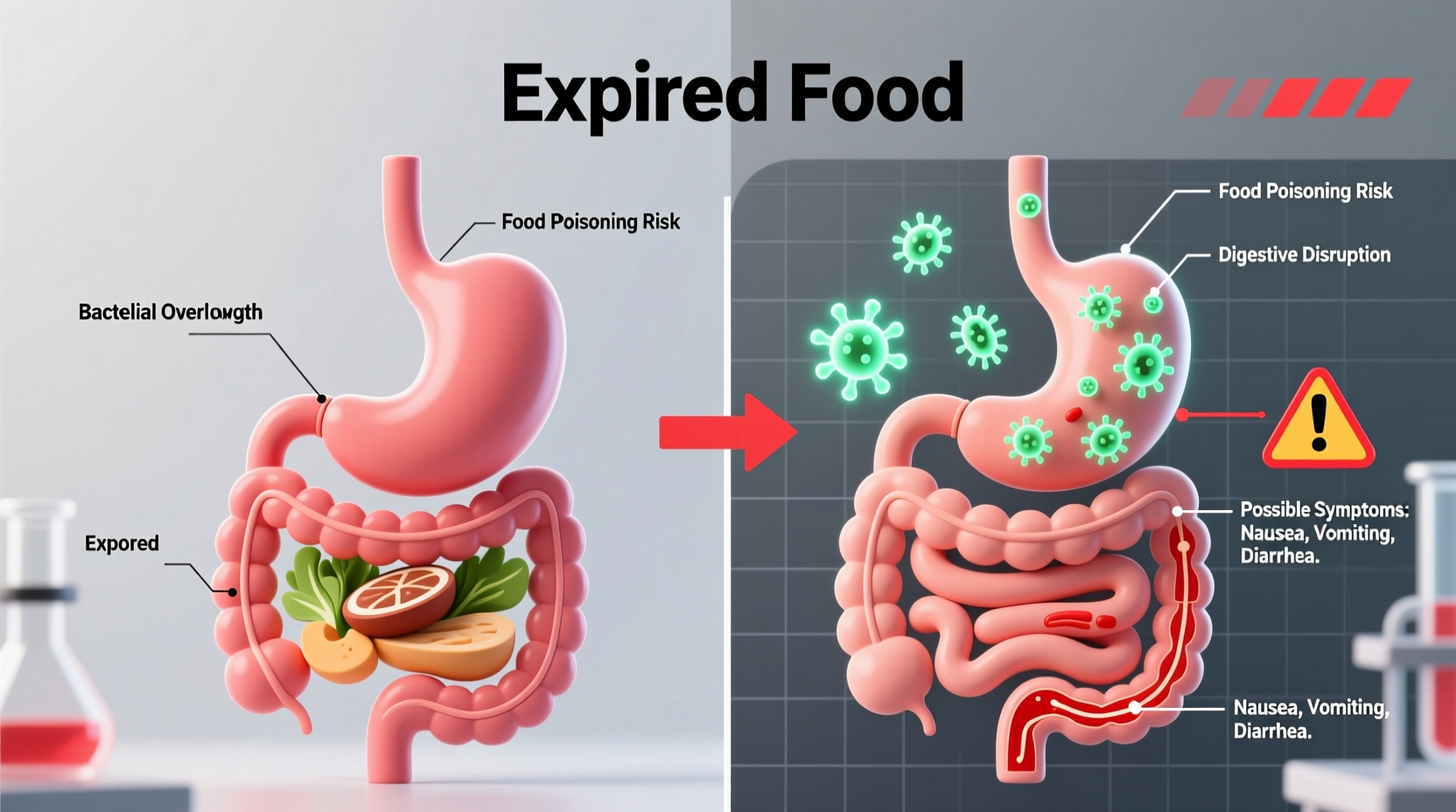Eating expired food typically causes no harm if the food was stored properly and shows no signs of spoilage, but consuming significantly expired or improperly stored items can lead to foodborne illness with symptoms like nausea, vomiting, diarrhea, and fever appearing within hours to days.
What Really Happens When You Eat Expired Food (And When to Worry)
That "expired" label in your pantry doesn't automatically mean danger. Understanding what actually happens when you eat expired food requires knowing the difference between date labels, spoilage signs, and real food safety risks. This guide cuts through the confusion with science-backed information to help you make informed decisions about food safety.
Your Immediate Food Safety Assessment Checklist
Before panicking about an expired item, follow this practical assessment process:
- Check the date type - Is it "best by," "use by," or "sell by"? (More on this below)
- Inspect for spoilage signs - Mold, unusual odors, texture changes
- Consider storage conditions - Was it refrigerated properly?
- Evaluate the food type - Some items remain safe long after dates
- Assess your personal risk factors - Immune status matters significantly
Decoding Food Date Labels: What They Actually Mean
Most confusion about expired food stems from misunderstanding date labels. These dates are primarily about quality, not safety (except for infant formula). Here's what each label really indicates:
| Date Label Type | What It Means | Typical Safety Window After Date |
|---|---|---|
| "Best By" or "Best Before" | Peak quality period (taste, texture) | Days to months depending on food type |
| "Use By" | Last recommended date for peak quality | 1-7 days for perishables if stored properly |
| "Sell By" | Store inventory management date | 2-3 days for refrigerated items after purchase |
| "Expires On" | Rarely used; indicates actual safety cutoff | Do not consume after this date |
According to the U.S. Food and Drug Administration, these dates are not federally regulated (except for infant formula), and manufacturers determine them based on quality testing rather than safety standards.
What Actually Happens in Your Body
When you consume expired food, several scenarios might occur:
Scenario 1: Nothing Happens (Most Common)
Properly stored food past its date but showing no spoilage signs typically causes no issues. Your body processes it normally because no harmful bacteria have developed. Dry goods like pasta, rice, and canned foods often remain safe for months or years past printed dates when stored correctly.
Scenario 2: Mild Digestive Discomfort
Slightly spoiled food might cause temporary symptoms like:
- Mild stomach upset
- Occasional gas or bloating
- Temporary changes in digestion
This usually resolves within 24 hours without medical intervention.
Scenario 3: Foodborne Illness (Less Common but Serious)
Consuming food contaminated with pathogenic bacteria (like Salmonella, E. coli, or Listeria) can cause food poisoning. Symptoms typically appear:
- 1-6 hours: Staphylococcus aureus, Bacillus cereus
- 6-24 hours: Clostridium perfringens
- 12-72 hours: Salmonella, E. coli
- 1-4 weeks: Listeria (particularly dangerous for pregnant women)
The Centers for Disease Control and Prevention estimates that foodborne illnesses cause 48 million illnesses, 128,000 hospitalizations, and 3,000 deaths annually in the United States.
High-Risk vs. Low-Risk Expired Foods
Not all expired foods pose equal risks. Understanding which categories require caution can prevent unnecessary food waste while keeping you safe.
Generally Safe Past Dates (With Proper Storage)
- Dry pasta (1-2 years past date)
- Canned goods (2-5 years past date if undamaged)
- Vinegar (indefinitely)
- Hard cheeses (weeks past date when properly wrapped)
- Pantry staples like rice, flour, sugar
Require Caution Past Dates
- Dairy products (milk, yogurt, soft cheeses)
- Raw meats and poultry
- Prepared deli items
- Leftovers (should be consumed within 3-4 days)
- Opened condiments

When Expired Food Becomes Dangerous: Critical Warning Signs
These visual and sensory indicators mean you should discard food immediately, regardless of the date:
- Mold growth - Except on hard cheeses and firm vegetables (cut generously around it)
- Unpleasant sour or rancid odors - Trust your nose as a first-line detector
- Slippery or slimy texture - Particularly on meats and produce
- Bulging cans or leaking packages - Indicates potential botulism risk
- Unusual color changes - Especially in meats and dairy
The USDA Food Safety and Inspection Service emphasizes that "when in doubt, throw it out" remains the safest approach for potentially compromised food.
What to Do If You've Eaten Expired Food
If you've consumed expired food and are concerned:
- Don't panic - Most expired food causes no issues
- Monitor for symptoms - Note when they appear and their severity
- Stay hydrated - Especially if experiencing vomiting or diarrhea
- Contact a healthcare provider if you experience:
- Fever above 101.5°F (38.6°C)
- Bloody stools
- Signs of dehydration (dizziness, reduced urination)
- Symptoms lasting more than 3 days
- Report severe cases to your local health department
Smart Food Storage Practices That Extend Safety
Proper storage significantly extends food safety beyond printed dates:
- Refrigerate promptly - Within 2 hours (1 hour if above 90°F/32°C)
- Use airtight containers - Prevents cross-contamination and moisture loss
- Keep refrigerator at 40°F (4°C) or below - Use a thermometer to verify
- Freeze items before they expire - Most foods maintain safety indefinitely when frozen
- Organize your pantry - Practice FIFO (First In, First Out) rotation
Reducing Food Waste While Staying Safe
The Natural Resources Defense Council reports that Americans waste approximately 40% of food produced. You can reduce waste responsibly by:
- Learning to trust your senses over printed dates
- Understanding which foods have long safety windows
- Using freezer storage strategically
- Implementing proper food rotation systems
- Learning basic food preservation techniques
Remember that food date labels primarily indicate quality, not safety. The USDA confirms that most food remains safe to eat well beyond printed dates when stored properly and showing no spoilage signs.
When to Seek Medical Attention Immediately
While most cases of consuming expired food cause no issues, seek immediate medical attention if you experience:
- Difficulty breathing or swallowing
- Severe abdominal pain
- Persistent vomiting preventing fluid intake
- Symptoms of botulism (blurred vision, muscle weakness, difficulty speaking)
- Signs of severe dehydration (extreme thirst, dry mouth, little to no urination)
Vulnerable populations including young children, elderly adults, pregnant women, and immunocompromised individuals should exercise greater caution with expired foods and consult healthcare providers sooner when symptoms appear.











 浙公网安备
33010002000092号
浙公网安备
33010002000092号 浙B2-20120091-4
浙B2-20120091-4